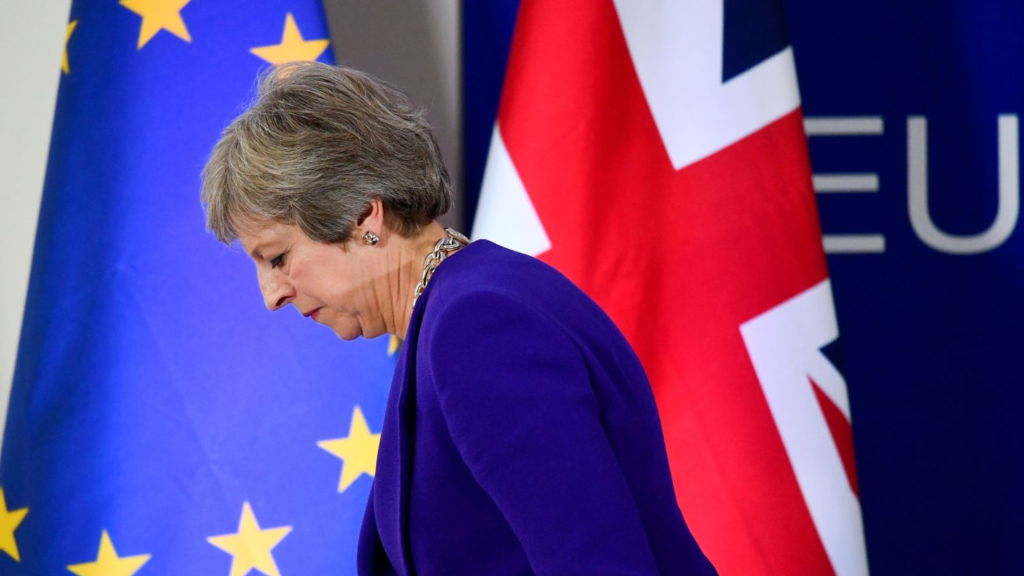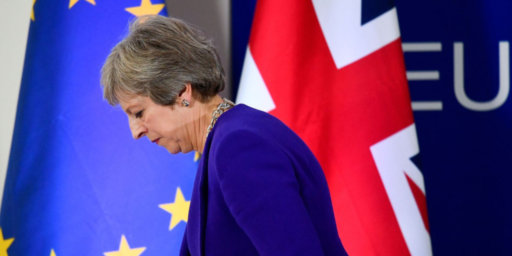Theresa May Survives No-Confidence Vote But The Future Remains Unclear
Theresa May survived the Labour Party's call for a no-confidence vote, but the future for her and for her country remain as hazy as ever.

As expected, British Prime Minister Theresa May has survived today’s no-confidence vote, but that still leaves unresolved both the future of Brexit and her own political future:
LONDON — Prime Minister Theresa May narrowly survived a vote of no-confidence in Parliament on Wednesday, but the result did little to quell the turmoil gripping the British government over her plan for leaving the European Union, coming a day after she suffered a historic defeat on the blueprint.
The House of Commons voted 325 to 306 to reject an opposition motion of no confidence. If successful, it almost certainly would have ousted her from power and probably would have forced a general election, adding still more layers of uncertainty in a country fast approaching the March 29 date for leaving the bloc — yet unable to agree on how to do so.
On Tuesday, Parliament dealt Mrs. May a crushing defeat, voting 432 to 202 to reject her painstakingly negotiated agreement with Brussels for leaving the European Union, or Brexit — by far the biggest losing margin for a government on a major issue in modern times.
Yet, a day later, more than 100 lawmakers from Mrs. May’s own Conservative Party who had opposed her Brexit bill voted to support her government, as did legislators from the Democratic Unionist Party in Northern Ireland who also hate Mrs. May’s plan.
The head-snapping sequence of events leaves Mrs. May — the leader of an intractably divided party, with a split cabinet, no parliamentary majority and no clear path forward on Brexit — more politically wounded than ever, yet somehow still standing.
Ordinarily, a prime minister would be expected to resign after suffering a big defeat on a signature bill, but Brexit has rewritten the rules of British politics. And once again, Mrs. May, who has defied many predictions of her political demise, lived to fight another day.
Her ability to soak up political punishment and survive is an acute frustration to Jeremy Corbyn, leader of the opposition Labour Party, who began the no-confidence motion by reminding lawmakers that Tuesday’s vote was “the largest defeat in the history of our democracy,” adding that Mrs. May was leading a “zombie government.”
Ian Blackford, the leader of the Scottish National Party’s lawmakers at Westminster, accused the prime minister of presiding over a “political collapse,” adding that, in its pursuit of Brexit, the country was “on a path to self-destruction.”
But with the no-confidence motion having failed, attention will turn rapidly to whether Mrs. May has a credible Plan B for Brexit. After surviving the vote, Mrs. May said that she would invite opposition party leaders to talks about Brexit. Mr. Corbyn called for her to first rule out the option of leaving the European Union without any agreement.
Earlier, the prime minister had vowed to somehow forge a deal that could win passage, yet when pressed she declined repeatedly to offer any specifics about what might change.
Nonetheless, there is growing speculation that she could seek a postponement of the March 29 deadline for Brexit, and suggestions that she will ultimately have to compromise with Labour lawmakers who want to keep a permanent customs union with the European bloc.
In a call with business leaders on Tuesday evening, the chancellor of the Exchequer, Philip Hammond, tried to reassure them that Britain could avoid a disorderly departure without any agreement, and raised the possibility of an extension to the negotiating period under Article 50 of the European Union’s treaty.
On Wednesday Mrs. May was careful not to rule out the prospect of extending the negotiating period, but noted that the bloc would agree on such a course only if “it was clear there was a plan that was moving toward an agreed deal.”
And while Mrs. May insisted that any Brexit plan must allow Britain to have its own trade policy, something that is impossible inside a customs union, the justice secretary, David Gauke, described that policy as “our starting point” and told Sky News, “I don’t think it’s a question of being boxed in.”
On Monday, Mrs. May is required to return to Parliament with proposals on how she intends to proceed, and that will give lawmakers the opportunity to add alternative suggestions — ranging from a customs union or a second referendum to a no-deal departure. Those could be voted on next week, giving some indication of whether there is any sign of a growing consensus among lawmakers.
The risk for Mrs. May is that, if she fails to move fast enough, she could lose control of Brexit to a newly emboldened Parliament.
As I noted this morning, this outcome is hardly a surprise given the fact that there was little chance that May would see members of her own party defect to express no confidence in the confidence, a vote that would set in motion a process that could have resulted in their party losing power or in new elections that would have an uncertain outcome given the current state of British politics. Additionally, May had received assurances from Tory’s partner in government, the Democratic Union Party from Northern Ireland, that it would continue to support May in no-confidence votes. Given the party unity and the support of the D.U.P., there was no way that May would lose the vote today, and that essentially means that she’ll stay in power notwithstanding that she had just suffered what appears to have been the worst Parliamentary defeat of any government in British history. The damage, however, is done.
Even with this victory, it’s unclear where things stand from here and how May can possibly forward with successfully. As previously noted, she has until Monday to present Parliament with an alternative plan or plans for resolving the Brexit issue and, while she does not need to get approval for these proposals from E.U. officials, the question of whether any of them have a chance of being accepted will loom over any subsequent debate. As I’ve noted, the chief E.U. negotiators have already said after yesterday’s vote that there is very little room for movement on the current deal, so it’s unclear what May can ask for that might actually be acceptable if and when she takes it to the negotiating table. The same thing can be said about the MPs who voted against the existing deal.
That being said there are a number of alternatives that May could propose. These include amendments to the current deal, the outlines of entirely new proposals that would effectively replace the existing deal, an extension of the current March 29th Brexit deadline, a second referendum that could potentially lead to a victory for “Remain” that would obviate the need for a Brexit deal, and a “hard,” no-deal Brexit. As I’ve noted before, the last alternative is generally considered the worse of all possible worlds but it may end up becoming reality if May is unable to get agreement from Parliament regarding how to proceed forward.





The EU will throw May a lifeline to prevent a Corbyn government.
I’ll say it again:
Personally I dislke the May deal; but her path to getting it is plain to me.
To force the ERG to support her plan she needs to block No Deal.
So long as No Deal on 31 March is the default neither ERG or DUP have any incentive to compromise.
ERG unlikely to risk Remain.
Pick up a few Labour Brexiteer rebels.
As for DUP, bribe the b*stards on a scale that would make a Saudi blush.
Job done.
From what I have read, anything she offers to yesterday’s “no” voters is liable to cost her an equal # of “yes” voters. The EU has given as much as they intend to and have no interest in renegotiating. On May’s last desperate dash thru European capitols in an attempt to make this witch’s brew more palatable to Parliament the most they were willing to do was some slight rephrasing that changed absolutely nothing.
This is a self inflicted wound of grievous nature to the UK’s economy and psyche and Europe feels no need whatsoever to triage this patient much less treat it.The EU does not need the UK. It would seem that a large percentage of Parliament still doesn’t understand that fact.
@Ben Wolf:
They might like to, and they’ll put as much makeup on the pig as they can.
But if Conservative demands rule out customs union and single market, the Irish border issue arises automatically and unavoidably.
Therefore EU can offer May nothing that will get the ERG to prefer her deal to No Deal Brexit, without betraying the interests of Ireland re. the border.
I can’t see them doing that.
If precedent is valued by the British, they may want to recall that at a prior moment of great crisis, they imported a Dutch prince to take over the throne of England in the 1680s.
Of course, he had to depose the sitting king. So the idea might not sit well with Mrs. May.
This is one of those situations you sometimes come across in modern role-playing games where you don’t know which side to support.
The Tories are assholes.
Labour is currently headed by an asshole.
And the EC is full of assholes.
They’re all assholes.
At this point I’m anticipating hard Brexit, and Ireland and Scotland declaring independence. With Russia spreading disinformation like this, and journalists deciding Twitter bots with 2 Followers can be “sources,” the corruption and incompetence in the West is only going to accelerate until the violence becomes unendurable. Then we either end up with fascist governments, or continuing strife.
A buffoon in the White House…a cripple at 10 Downing Street…the two members of the Special Relationship are in quite the pickle…
Uh, the root of the problem is that a hard no deal Brexit is considered the ideal outcome by a bunch of voters and MP’s. I think they are completely wrong, but my opinion doesn’t matter. The facts are that you cannot have a hard exit from the customs union AND an open border between Ireland and Northern Ireland. You cannot stay in the customs union to keep open trade borders, and get rid of everything else EU related without the EU’s agreement, and since that would effectively mean the end of the EU (why would anyone do anything other than a customs union in that case?) they will never agree. But as long as a large segment of voters and MP’s think they can magically accomplish the latter (or that it will somehow be simple to negotiate individual trade deals and somehow not disrupt all the points of entry while that is going on), there is no deal to be made. Much like Trump, the hard Brexiters keep expecting the other side to just fold. It’s not going to happen, and I don’t see any way for anyone to square this circle.
Which means hard Brexit by default, and as I said, that’s just fine for many (morons who happen to have power). Britain is f—–d.
“That being said there are a number of alternatives that May could propose.”
That would be the case except, in the spirit of the Republican/Conservative response to the ACA, they seem to have entered into the deal with no idea whatsoever of what they wanted to do other than reject the status quo.
Conservatives don’t seem to be good at this whole “governing” thing. It appears to be a general rule at the moment, not limited to the US.
@Just Another Ex-Republican: The “solution” suggested often by commentators over at the Torygraph to the Ireland border question is “hey, Ireland should leave the EU as well and join up back with Britain!”
Lunatics, the lot of them.